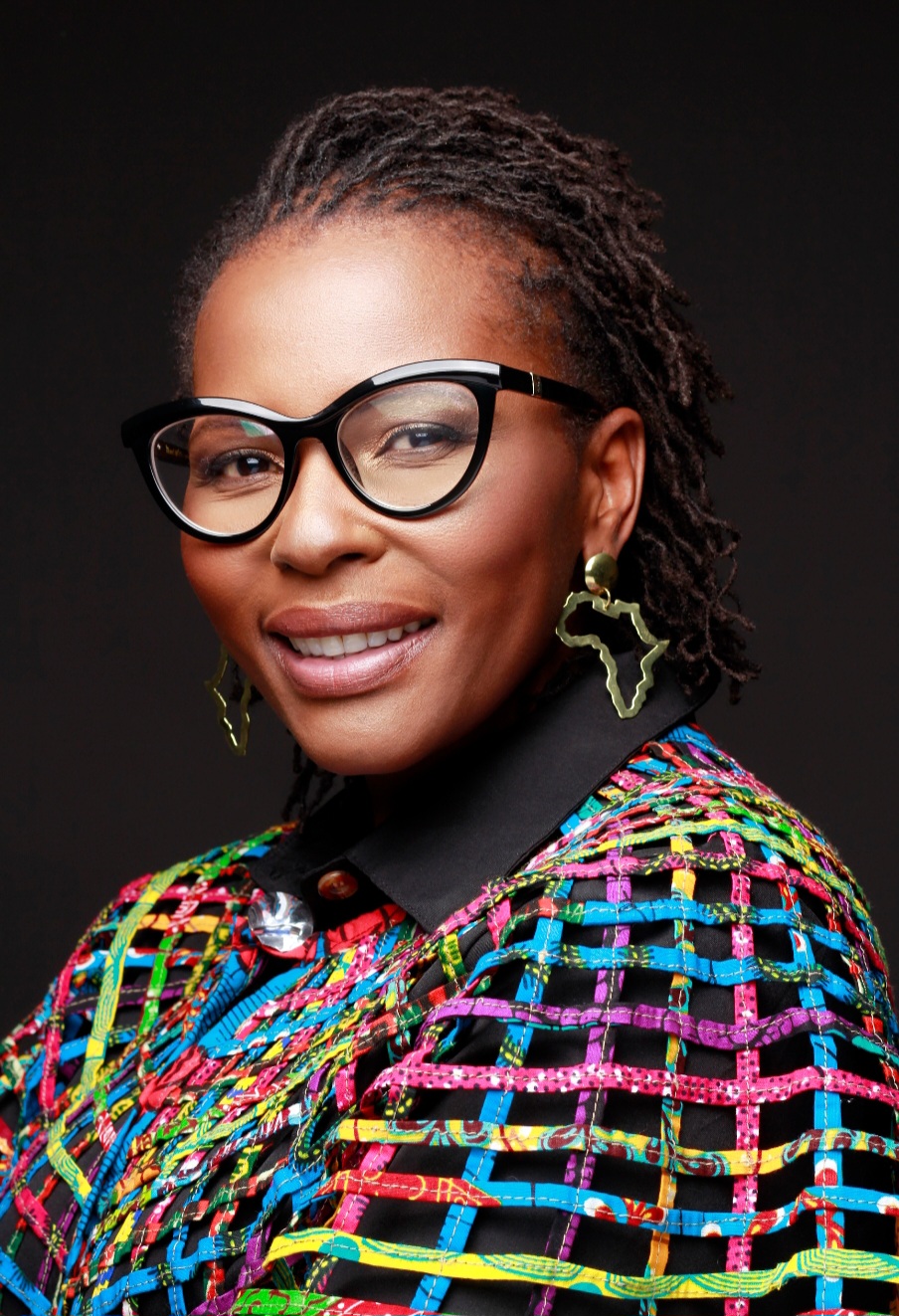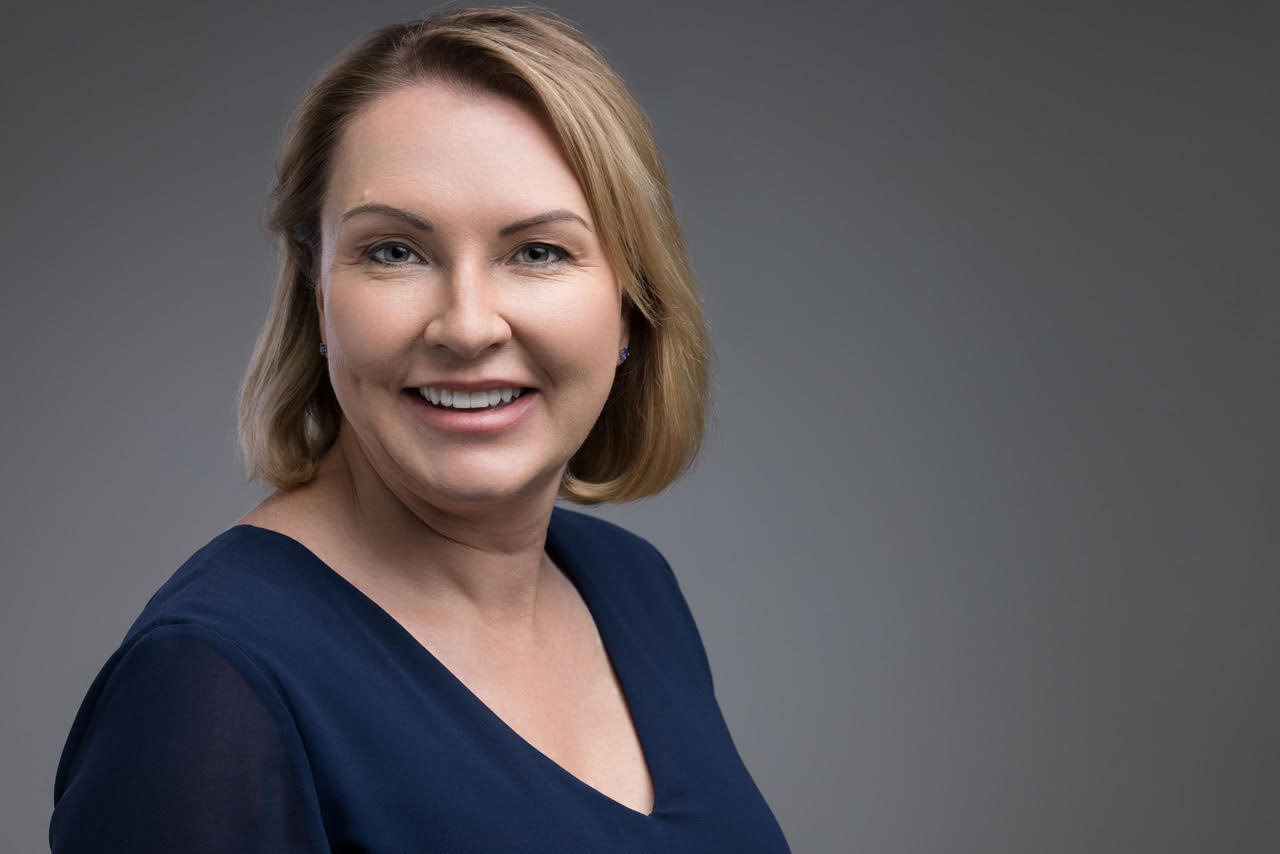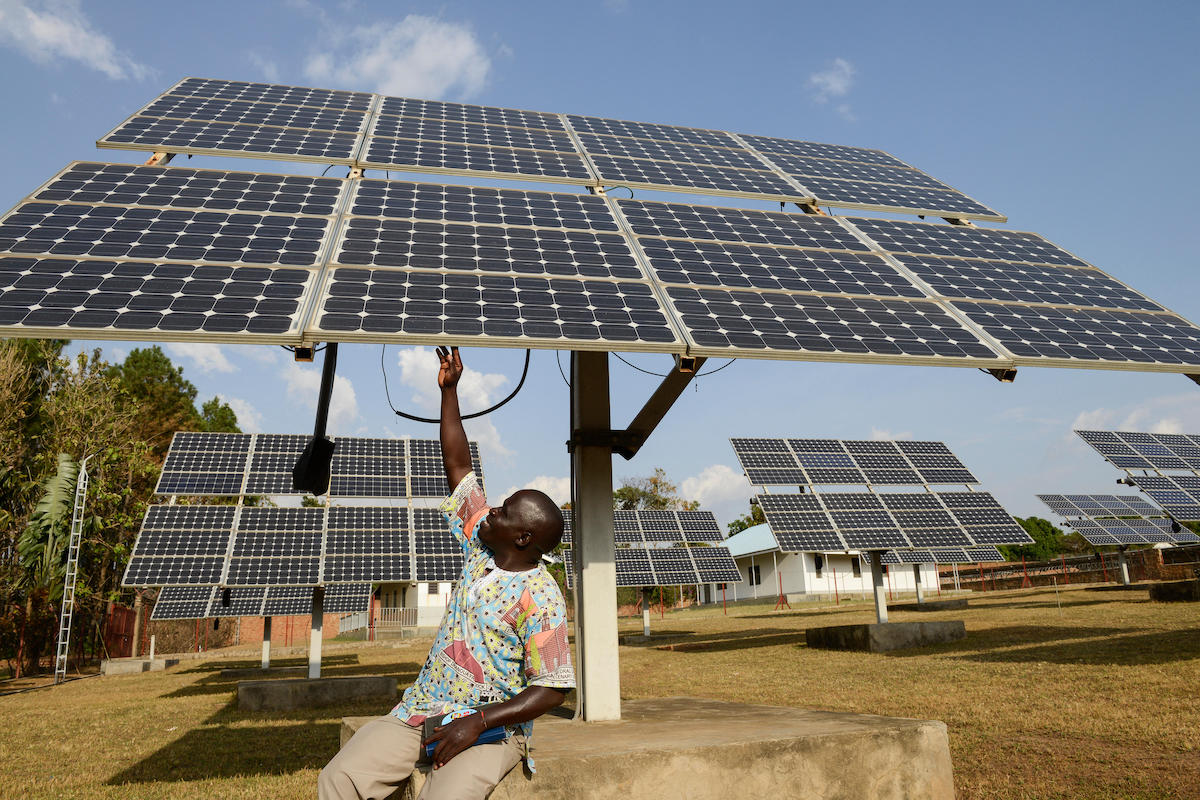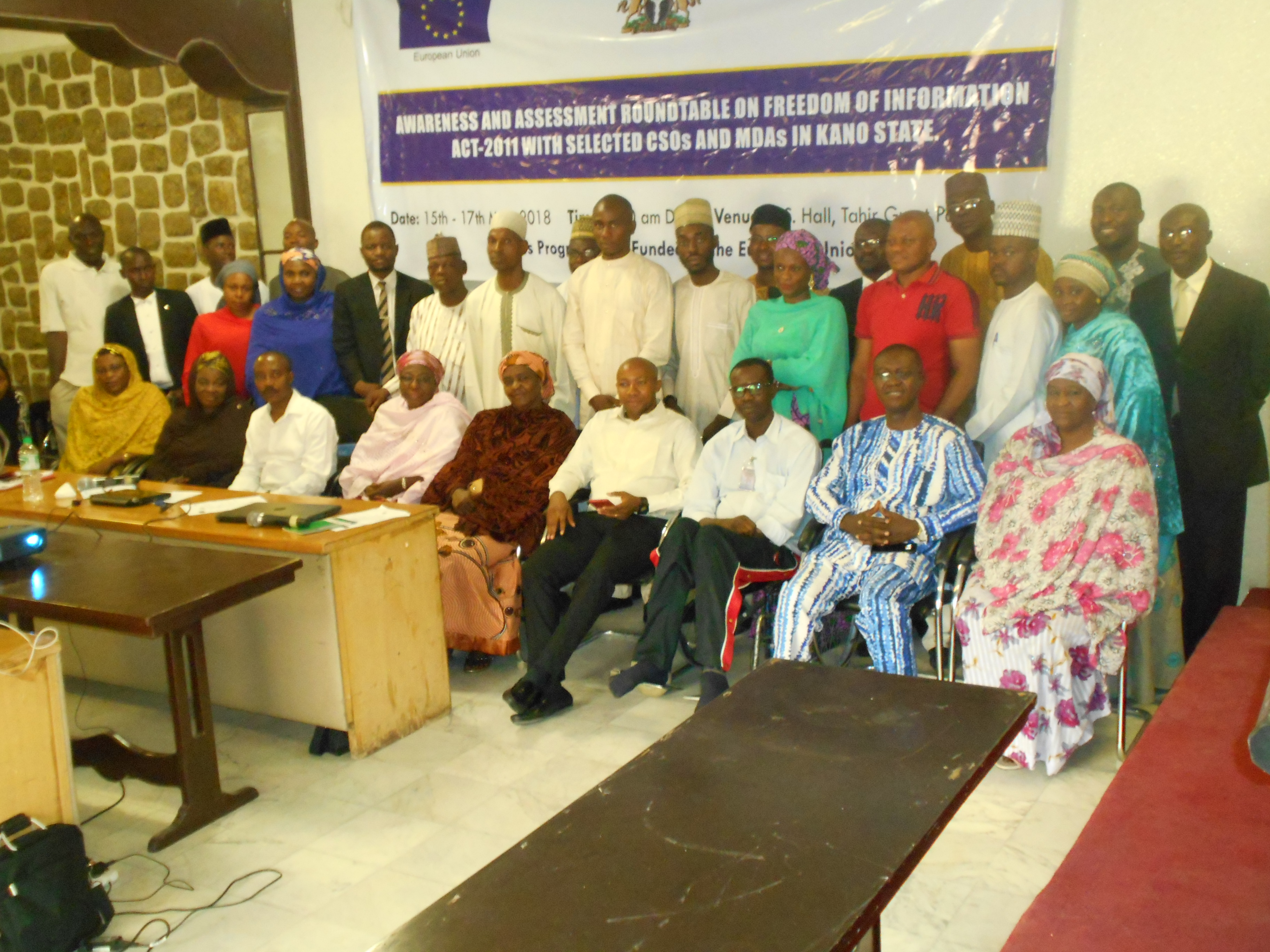Feature/OPED
ROLAC, SCRAP-C: Spreading Message of FOI Act in Nigeria

By Walter Duru
From East to the West, North and South, the Rule of Law and Anti-Corruption-ROLAC programme of the European Union and the Strengthening Citizens Resistance Against the Prevalence of Corruption – SCRAP-C programme of the United Kingdom Aid have been traversing the length and breadth of Nigeria, spreading the good news of the Freedom of Information Act.
For ROLAC, an anti-corruption programme funded by the European Union, but managed by the British Council, the journey started with an assessment of the use and implementation of the Freedom of Information Act 2011. The assessment, conducted in collaboration with the Freedom of Information Coalition, Nigeria – FOICN and Media Initiative against Injustice, Violence and Corruption-MIIVOC on one hand, and the Federal Ministry of Justice on another hand, focused on four states of: Adamawa, Kano, Lagos and Anambra, and of course, the Federal capital territory for federal Public Institutions and civil society organisations.
The need for empirical data on the level of citizens’ knowledge and use of the FOI Act on one hand and the level of compliance with the provisions of the Act by public institutions on the other hand informed the decision of the ROLAC programme to support a Rapid Response Assessment on same. The Assessment of the level of FOI implementation and compliance among federal public institutions, as well as state public institutions in Adamawa, Kano, Lagos and Anambra was the crux of the study for public institutions. Structured Questionnaire, Observation and Personal Interview were the instruments used for data collection. The choice of the four states and the federal capital territory was informed by the fact that they are the focal states/areas of operation of the ROLAC programme.
The study was coordinated by the leadership of the Freedom of Information Coalition, Nigeria. Findings show that the knowledge gap on the provisions and use of the FOI Act remains wide, particularly, at the state level, requiring that deliberate steps be taken to enhance same.
According to the findings, the percentage level of awareness of public institutions on the FOI Act in Adamawa is 9%; Lagos- 20%; Kano -11%; Anambra -10%; while the federal capital territory is 35%.
On compliance, the percentage level of public institutions with the FOI Act in Adamawa is 0%; Lagos – 10%; Kano – 7%; Anambra – 0%, while the federal capital territory is 25%.
On the part of the Civil Society, about 90% of the respondents in Adamawa have no knowledge of the provisions and application of the FOI Act; 87% in Lagos; 93% in Kano and 91% in Anambra do not know the provisions and applications of the FOI Act.
On the use of the FOI Act, data gathered shows that 93% of respondents in Adamawa state have never made an FOI request; 87% in Lagos; 91% in Kano and 90% of civil society actors studied in Anambra have never made an FOI request.
The findings therefore informed ROLAC’s decision to, in collaboration with the Freedom of Information Coalition, Nigeria-FOICN, Media Initiative against Injustice, Violence and Corruption-MIIVOC and the Federal Ministry of Justice to commence an elaborate capacity building programme, targeting state and non-state actors in the areas studied.
The overall objective was to increase citizens’ demand for accountability and transparency from public institutions, through enhanced awareness and capacity on effective use of the FOI Act on the demand side (civil society); and to improve compliance and implementation of the FOI Act on the supply side (public institutions). So far, two states- Adamawa and Kano have benefited from the week-long capacity building exercise, which took stakeholders through the rudiments, provisions, application and all the elements of the FOI Act, 2011. Lagos State is next to benefit from the exercise. Following the trainings, excited Kano State Civil Society actors are firing from all corners, making demands on public institutions.
The ROLAC FOI trainings are delivered by the Chairman, Board of Governors, Freedom of Information Coalition, Nigeria- FOICN, Dr. Walter Duru, Secretary of the Board of FOICN, Longe Ayode and Mr. Benjamin Okolo, Head, FOI Unit of the Federal Ministry of Justice, who always leads the Ministry’s team. Pwanakei Dala, ROLAC’s anti-corruption programme officer is always on ground to give support, while the ROLAC Staff in the focal states ensure that everything is in place for each of the trainings. ROLAC’s anti-corruption Programme Manager, Emmanuel Uche is always on ground to show leadership.
The highlights of the training are Paper presentations, practical FOI request writing by civil society participants; practical writing of responses to FOI requests by participants from public institutions, interactive and experience sharing sessions, questions and answers sessions, among others.
Speaking on the progress recorded so far, ROLAC’s Anti-Corruption Programme Manager, Mr. Emmanuel Uche expressed delight at the interest of citizens of the states to participate in governance, taking advantage of the FOI Act.
Uche, an anti-corruption expert described the Freedom of Information Act as the foundation stone for strengthening democratic values.
“The FOI Act is the most critical foundation stone for strengthening democratic values of any society. Democracy, which is also one of the core tenets of a free society is based on choice. Choice is not possible where citizens do not have perfect access to information on the available choices. Access to information law is one of the best things that have happened to Nigeria.”
Speaking on ROLAC’s interest in FOI, National Programme Manager, Rule of Law and Anti-Corruption Programme, Mr. Danladi Plang described the Act as central to the work of the programme, following its capacity to entrench openness in governance.
“Well, ROLAC has three central themes – Criminal Justice, Anti-corruption and Access to Justice. Our work on the FOI supports and complements the work on anti-corruption, particularly, in the area of prevention. Increased citizens’ use of the FOI Act will improve transparency in the system. When public institutions realize that citizens now have a law that empowers them to ask questions about government business and get the answers they desire, they will be a bit more circumspect. There is no doubt that effective implementation of the FOI Act will prevent and reduce corruption in Nigeria”
Lamenting over the low compliance level with the Act, Plang identified low awareness on the existence and provisions of the Act as one of the challenges, promising that ROLAC will do more in spreading the message of the FOI Act. He added that the “FOI Act can help to open up government for citizens participation,” making a strong case for grassroots advocacy on the Act.
Frowning at the reluctance of some state governments to implement the FOI Act, Plang argued that “a reasonable government should encourage the citizens to participate in governance, if they are genuinely interested in the welfare of the citizens.”
Adding her voice, Component Manager on Enhancing Civil Society Engagement in Criminal Justice and Anti-Corruption Reforms, Toyosi Giwa described ROLAC’s Civil Society FOI engagements as strategic.
According to her, “for Civil Society to effectively engage the government, they need to have their capacity enhanced. Our interest in training Civil Society on the use of the FOI Act is aimed at deepening their understanding of the provisions and applications of the Act to enable them apply same effectively. Government is not usually too responsive to the citizens. One of the tools to hold the government accountable is the FOI Act. We are committed to enhancing citizens’ capacity on FOI Act to increase their participation in governance, with a view to ensuring that transparency is a culture in Nigeria’s public institutions.”
Impressed by the impact of the engagements so far, Giwa stressed: “Available statistics show that some of the civil society actors in the states we have trained are already using the law. This is very encouraging. Reports we are getting from Kano State, for instance are very encouraging. It shows the quality of engagement; but we are not there yet. We want to start seeing the outcome of those FOI requests and positive responses from public institutions.”
Continuing, she stressed that “low knowledge and application of the FOI Act is as a result of opaqueness of government. If government is open, it should even be promoting the FOI act. The ongoing training is timely. The approach of ROLAC is also very good. Training public institutions alongside civil society is a brilliant approach, so they are on the same page. A lot of awareness still needs to be created.”
She however advised civil society actors in Nigeria to remain steadfast in their efforts in speaking for the people.
In another development, as part of its support towards ensuring openness in public service and effective citizens’ participation in governance, the Strengthening Citizens’ Resistance Against Prevalence of Corruption – SCRAP-C Project organised a 3-day training (in three different locations) for civil society organisations and citizens in Nigeria on the use of the Freedom of Information Act, 2011.
The first phase of the training was held in three locations: Lagos (for south-west participants), Uyo (for south-south participants) and Enugu (for south east participants). The training was carefully designed to build the capacity of participants to have a working knowledge of the purpose, provisions, application and benefits of the FOI Act. It was further intended that at the end of the training, participants drawn from across the Southeast, South-South and South Western states of Nigeria, were empowered with enhanced capacity in the use of the FOI Act. It was aimed at deepening participants’ understanding of the law.
The training was delivered by four resource persons: Newton Otsemaye, Project Manager, SCRAP-C; Chairman, Board of Governors, Freedom of Information Coalition, Nigeria and Executive Director, Media Initiative against Injustice, Violence and Corruption-MIIVOC, Dr. Walter Duru; Dr. Tope Olaifa of Federal University of Agriculture, Abeokuta and Mr. Ezenwa Nwagwu of ‘Say No Campaign’.
Speaking on the relevance of the training, SCRAP-C Project Manager, Newton Otsemaye explains:
“SCRAP-C is interested in enhancing the capacity of civil society to participate actively in the anti-corruption war. The FOI Act is a veritable tool for the citizens to hold the government accountable. The idea is that ensuring that the citizens understand the provisions and application of the FOI Act is one sure way of increasing their participation by asking relevant questions regarding government activities. We are interested in ensuring that the citizens take advantage of the FOI Act to make the government more accountable.”
The SCRAP-C project is a 5-year UKaid supported project through the Anti-Corruption in Nigeria (ACORN) Programme. The project seeks to address corruption through change in social norms and attitudes that encourage corruption in Nigeria. The project is managed by a consortium of three National Civil Society Organisations: ActionAid Nigeria, Centre for Democracy and Development, and Centre for Communication and Social Impact.
With the great efforts of ROLAC and SCRAP-C in FOI implementation, donor agencies have shown that they are indeed interested in the development of Nigeria by supporting initiatives that will open up government to the citizens.
ROLAC, in addition to operating at the federal capital-Abuja, has four focal states of Adamawa, Kano, Lagos and Anambra. SCRAP-C has six states- Akwa Ibom, Bornu, Enugu, Kaduna, Kano/Jigawa and Lagos. Other donor agencies should quickly take steps to support the spread of the message of the FOI Act to other parts of the federation.
Citizens must therefore take advantage of the FOI Act to participate in governance, hold the government accountable and secure the future of the citizens yet unborn.
Until citizens own the anti corruption war, it may not go far. One sure instrument for an effective war against corruption in Nigeria is the FOI Act. All Nigerians must therefore embrace it, take advantage of it and participate in the business of governance.
Public Institutions/office holders themselves must realize that they manage the people’s resources on trust. Any government that claims to have the interest of the citizens at heart must therefore support the vigorous implementation of Nigeria’s Freedom of Information Act.
A culture of transparency and accountability in governance is the surest solution to Nigeria’s woes. This, the FOI Act can achieve. No genuine anti-corruption war can be won without the vigorous implementation of the FOI Act.
Feature/OPED
Why the Future of PR Depends on Healthier Client–Agency Partnerships

By Moliehi Molekoa
The start of a new year often brings optimism, new strategies, and renewed ambition. However, for the public relations and reputation management industry, the past year ended not only with optimism but also with hard-earned clarity.
2025 was more than a challenging year. It was a reckoning and a stress test for operating models, procurement practices, and, most importantly, the foundation of client–agency partnerships. For the C-suite, this is not solely an agency issue.
The year revealed a more fundamental challenge: a partnership problem that, if left unaddressed, can easily erode the very reputations, trust, and resilience agencies are hired to protect. What has emerged is not disillusionment, but the need for a clearer understanding of where established ways of working no longer reflect the reality they are meant to support.
The uncomfortable truth we keep avoiding
Public relations agencies are businesses, not cost centres or expandable resources. They are not informal extensions of internal teams, lacking the protection, stability, or benefits those teams receive. They are businesses.
Yet, across markets, agencies are often expected to operate under conditions that would raise immediate concerns in any boardroom:
-
Unclear and constantly shifting scope
-
Short-term contracts paired with long-term expectations
-
Sixty-, ninety-, even 120-day payment terms
-
Procurement-led pricing pressure divorced from delivery realities
-
Pitch processes that consume months of senior talent time, often with no feedback, timelines, or accountability
If these conditions would concern you within your own organisation, they should also concern you regarding the partner responsible for your reputation.
Growth on paper, pressure in practice
On the surface, the industry appears healthy. Global market valuations continue to rise. Demand for reputation management, stakeholder engagement, crisis preparedness, and strategic counsel has never been higher.
However, beneath this top-line growth lies the uncomfortable reality: fewer than half of agencies expect meaningful profit growth, even as workloads increase and expectations rise.
This disconnect is significant. It indicates an industry being asked to deliver more across additional platforms, at greater speed, with deeper insight, and with higher risk exposure, all while absorbing increased commercial uncertainty.
For African agencies in particular, this pressure is intensified by factors such as volatile currencies, rising talent costs, fragile data infrastructure, and procurement models adopted from economies with fundamentally different conditions. This is not a complaint. It is reality.
This pressure is not one-sided. Many clients face constraints ranging from procurement mandates and short-term cost controls to internal capacity gaps, which increasingly shift responsibility outward. But pressure transfer is not the same as partnership, and left unmanaged, it creates long-term risk for both parties.
The pitching problem no one wants to own
Agencies are not anti-competition. Pitches sharpen thinking and drive excellence. What agencies increasingly challenge is how pitching is done.
Across markets, agencies participate in dozens of pitches each year, with success rates well below 20%. Senior leaders frequently invest unpaid hours, often with limited information, tight timelines, and evaluation criteria that prioritise cost over value.
And then, too often, dead silence, no feedback, no communication about delays, and a lack of decency in providing detailed feedback on the decision drivers.
In any other supplier relationship, this would not meet basic governance standards. In a profession built on intellectual capital, it suggests that expertise is undervalued.
This is also where independent pitch consultants become increasingly important and valuable if clients choose this route to help facilitate their pitch process. Their role in the process is not to advocate for agencies but to act as neutral custodians of fairness, realism, and governance. When used well, they help clients align ambition with timelines, scope, and budget, and ensure transparency and feedback that ultimately lead to better decision-making.
“More for less” is not a strategy
A particularly damaging expectation is the belief that agencies can sustainably deliver enterprise-level outcomes on limited budgets, often while dedicating nearly full-time senior resources. This is not efficiency. It is misalignment.
No executive would expect a business unit to thrive while under-resourced, overexposed, and cash-constrained. Yet agencies are often required to operate under these conditions while remaining accountable for outcomes that affect market confidence, stakeholder trust, and brand equity.
Here is a friendly reminder: reputation management is not a commodity. It is risk management.
It is value creation. It also requires investment that matches its significance.
A necessary reset
As leadership teams plan for growth, resilience, and relevance, there is both an opportunity and a responsibility to reset how agency partnerships are structured.
That reset looks like:
-
Contracts that balance flexibility and sustainability
-
Payment terms that reflect mutual dependency
-
Pitch processes that respect time, talent, and transparency for all parties
-
Scopes that align ambition with available budgets
-
Relationships based on professional parity rather than power imbalance
This reset also requires discipline on the agency side – clearer articulation of value, sharper scoping, and greater transparency about how senior expertise is deployed. Partnership is not protectionism; it is mutual accountability.
The Leadership Question That Matters
The question for the C-suite is quite simple:
If your agency mirrored your internal standards of governance, fairness, and accountability, would you still be comfortable with how the relationship is structured?
If the answer is no, then change is not only necessary but also strategic. Because strong brands are built on strong partnerships. Strong partnerships endure only when both sides are recognised, respected, and resourced as businesses in their own right.
The agencies that succeed and the brands that truly thrive will be those that recognise this early and act deliberately.
Moliehi Molekoa is the Managing Director of Magna Carta Reputation Management Consultants and PRISA Board Member
Feature/OPED
Directing the Dual Workforce in the Age of AI Agents

By Linda Saunders
We will be the last generation to work with all-human workforces. This is not a provocative soundbite but a statement of fact, one that signals a fundamental shift in how organisations operate and what leadership now demands. The challenge facing today’s leaders is not simply adopting new technology but architecting an entirely new operating model where humans and autonomous AI agents work in concert.
According to Salesforce 2025 CEO research, 99% of CEOs say they are prepared to integrate digital labor into their business, yet only 51% feel fully prepared to do so. This gap between awareness and readiness reveals the central tension of this moment: we recognise the transformation ahead but lack established frameworks for navigating it. The question is no longer whether AI agents will reshape work, but whether leaders can develop the new capabilities required to direct this dual workforce effectively.
The scale of change is already visible in the data. According to the latest CIO trends, AI implementation has surged 282% year over year, jumping from 11% to 42% of organisations deploying AI at scale. Meanwhile, the IDC estimates that digital labour will generate a global economic impact of $13 trillion by 2030, with their research suggesting that agentic AI tools could enhance productivity by taking on the equivalent of almost 23% of a full-time employee’s weekly workload.
With the majority of CEOs acknowledging that digital labor will transform their company structure entirely, and that implementing agents is critical for competing in today’s economic climate, the reality is that transformation is not coming, it’s already here, and it requires a fundamental change to the way we approach leadership.
The Director of the Dual Workforce
Traditional management models, built on hierarchies of human workers executing tasks under supervision, were designed for a different era. What is needed now might be called the Director of the dual workforce, a leader whose mandate is not to execute every task but to architect and oversee effective collaboration between human teams and autonomous digital labor. This role is governed by five core principles that define how AI agents should be structured, deployed and optimised within organisations.
Structure forms the foundation. Just as organisational charts define human roles and reporting lines, leaders must design clear frameworks for AI agents, defining their scope, establishing mandates and setting boundaries for their operation. This is particularly challenging given that the average enterprise uses 897 applications, only 29% of which are connected. Leaders must create coherent structures within fragmented technology landscapes as a strong data foundation is the most critical factor for successful AI implementation. Without proper structure, agents risk operating in silos or creating new inefficiencies rather than resolving existing ones.
Oversight translates structure into accountability. Leaders must establish clear performance metrics and conduct regular reviews of their digital workforce, applying the same rigour they bring to managing human teams. This becomes essential as organisations scale beyond pilot projects and we’ve seen a significant increase in companies moving from pilot to production, indicating that the shift from experimentation to operational deployment is accelerating. It’s also clear that structured approaches to agent deployment can deliver return on investment substantially faster than do-it-yourself methods whilst reducing costs, but only when proper oversight mechanisms are in place.
To ensure agents learn from trusted data and behave as intended before deployment, training and testing is required. Leaders bear responsibility for curating the knowledge base agents access and rigorously testing their behaviour before release. This addresses a critical challenge: leaders believe their most valuable insights are trapped in roughly 19% of company data that remains siloed. The quality of training directly impacts performance and properly trained agents can achieve 75% higher accuracy than those deployed without rigorous preparation.
Additionally, strategy determines where and how to deploy agent resources for competitive advantage. This requires identifying high-value, repetitive or complex processes where AI augmentation drives meaningful impact. Early adoption patterns reveal clear trends: according to the Salesforce Agentic Enterprise Index tracking the first half of 2025, organisations saw a 119% increase in agents created, with top use cases spanning sales, service and internal business operations. The same research shows employees are engaging with AI agents 65% more frequently, and conversations are running 35% longer, suggesting that strategic deployment is finding genuine utility rather than novelty value.
The critical role of observability
The fifth principle, to observe and track, has emerged as perhaps the most critical enabler for scaling AI deployments safely. This requires real-time visibility into agent behaviour and performance, creating transparency that builds trust and enables rapid optimisation.
Given the surge in AI implementation, leaders need unified views of their AI operations to scale securely. Success hinges on seamless integration into core systems rather than isolated projects, and agentic AI demands new skills, with the top three in demand being leadership, storytelling and change management. The ability to observe and track agent performance is what makes this integration possible, allowing leaders to identify issues quickly, demonstrate accountability and make informed decisions about scaling.
The shift towards dual workforce management is already reshaping executive priorities and relationships. CIOs now partner more closely with CEOs than any other C-suite peer, reflecting their changing and central role in technology-driven strategy. Meanwhile, recent CHRO research found that 80% of Chief Human Resources Officers believe that within five years, most workforces will combine humans and AI agents, with expected productivity gains of 30% and labour cost reductions of 19%. The financial perspective has also clearly shifted dramatically, with CFOs moving away from cautious experimentation toward actively integrating AI agents into how they assess value, measure return on investment, and define broader business outcomes.
Leading the transition
The current generation of leaders are the crucial architects who must design and lead this transition. The role of director of the dual workforce is not aspirational but necessary, grounded in principles that govern effective agent deployment. Success requires moving beyond viewing AI as a technical initiative to understanding it as an organisational transformation that touches every aspect of operations, from workflow design to performance management to strategic planning.
This transformation also demands new capabilities from leaders themselves. The skills that defined effective management in all-human workforces remain important but are no longer sufficient. Leaders must develop fluency in understanding agent capabilities and limitations, learn to design workflows that optimally divide labor between humans and machines, and cultivate the ability to measure and optimise performance across both types of workers. They must also navigate the human dimensions of this transition, helping employees understand how their roles evolve, ensuring that the benefits of productivity gains are distributed fairly, and maintaining organisational cultures that value human judgement and creativity even as routine tasks migrate to digital labor.
The responsibility to direct what comes next, to architect systems where human creativity, judgement and relationship-building combine with the scalability, consistency and analytical power of AI agents, rests with today’s leaders. The organisations that thrive will be those whose directors embrace this mandate, developing the structures, oversight mechanisms, training protocols, strategic frameworks and observability systems that allow dual workforces to deliver on their considerable promise.
Feature/OPED
Energy Transition: Will Nigeria Go Green Only To Go Broke?

By Isah Kamisu Madachi
Nigeria has been preparing for a sustainable future beyond oil for years. At COP26 in the UK, the country announced its commitment to carbon neutrality by 2060. Shortly after the event, the Energy Transition Plan (ETP) was unveiled, the Climate Change Act 2021 was passed and signed into law, and an Energy Transition Office was created for the implementations. These were impressive efforts, and they truly speak highly of the seriousness of the federal government. However, beyond climate change stress, there’s an angle to look at this issue, because in practice, an important question in this conversation that needs to be answered is: how exactly will Nigeria’s economy be when oil finally stops paying the bills?
For decades, oil has been the backbone of public finance in Nigeria. It funds budgets, stabilises foreign exchange, supports states through monthly FAAC allocations, and quietly props up the naira. Even when production falls or prices fluctuate, the optimism has always been that oil will somehow carry Nigeria through the storms. It is even boldly acknowledged in the available policy document of the energy transition plan that global fossil fuel demand will decline. But it does not fully confront what that decline means for a country of roughly 230 million people whose economy is still largely structured around oil dollars.
Energy transition is often discussed from the angle of the emissions issue alone. However, for Nigeria, it is first an economic survival issue. Evidence already confirms that oil now contributes less to GDP than it used to, but it remains central to government revenue and foreign exchange earnings. When oil revenues drop, the effects are felt in budget shortfalls, rising debt, currency pressure, and inflation. Nigerians experienced this reality during periods of oil price crashes, from 2014 to the pandemic shock.
The Energy Transition Plan promises to lift 100 million Nigerians out of poverty, expand energy access, preserve jobs, and lead a fair transition in Africa. These are necessary goals for a future beyond fossil fuels. But this bold ambition alone does not replace revenue. If oil earnings shrink faster than alternative sources grow, the transition risks deepening fiscal stress rather than easing it. Without a clear post-oil revenue strategy tied directly to the transition, Nigeria may end up cleaner with the net-zero goals achieved, but poorer.
Jobs need to be considered, too. The plan recognises that employment in the oil sector will decline over time. What should be taken into consideration is where large-scale employment will come from. Renewable energy, of course, creates jobs, but not automatically, and not at the scale oil-related value chains once supported, unless deliberately designed to do so. Solar panels assembled abroad and imported into Nigeria will hardly replace lost oil jobs. Local manufacturing, large-scale skills development, and industrial policy are what make the difference, yet these remain weak links in Nigeria’s transition conversation.
The same problem is glaringly present in public finance. States that depend heavily on oil-derived allocations are already struggling to pay salaries, though with improvement after fuel subsidy removal. A future with less oil revenue will only worsen this unless states are supported to proactively build formidably productive local economies. Energy transition, if disconnected from economic diversification, could unintentionally widen inequality between regions and states and also exacerbate dependence on internal and external borrowing.
There is also the foreign exchange question. Oil export is still Nigeria’s main source of dollars. As global demand shifts and revenues decline, pressure on the naira will likely intensify unless non-oil exports rise in a dramatically meaningful way. However, Nigeria’s non-oil export base remains very narrow. Agriculture, solid minerals, manufacturing, and services are often mentioned, but rarely aligned with the Energy Transition Plan in a concrete and measurable way.
The core issue here is not about Nigeria wanting to transition, but that it wants to transition without rethinking how the economy earns, spends, and survives. Clean energy will not automatically fix public finance, stabilise the currency, or replace lost oil income and jobs. Those outcomes require deliberate and strategic economic choices that go beyond power generation and meeting emissions targets. Otherwise, the country will be walking into a future where oil is no longer dependable, yet nothing else has been built strongly enough to pay the bills as oil did.
Isah Kamisu Madachi is a policy analyst and development practitioner. He writes from Abuja and can be reached via [email protected]
-

 Feature/OPED6 years ago
Feature/OPED6 years agoDavos was Different this year
-
Travel/Tourism9 years ago
Lagos Seals Western Lodge Hotel In Ikorodu
-

 Showbiz3 years ago
Showbiz3 years agoEstranged Lover Releases Videos of Empress Njamah Bathing
-

 Banking8 years ago
Banking8 years agoSort Codes of GTBank Branches in Nigeria
-

 Economy3 years ago
Economy3 years agoSubsidy Removal: CNG at N130 Per Litre Cheaper Than Petrol—IPMAN
-

 Banking3 years ago
Banking3 years agoSort Codes of UBA Branches in Nigeria
-

 Banking3 years ago
Banking3 years agoFirst Bank Announces Planned Downtime
-

 Sports3 years ago
Sports3 years agoHighest Paid Nigerian Footballer – How Much Do Nigerian Footballers Earn














